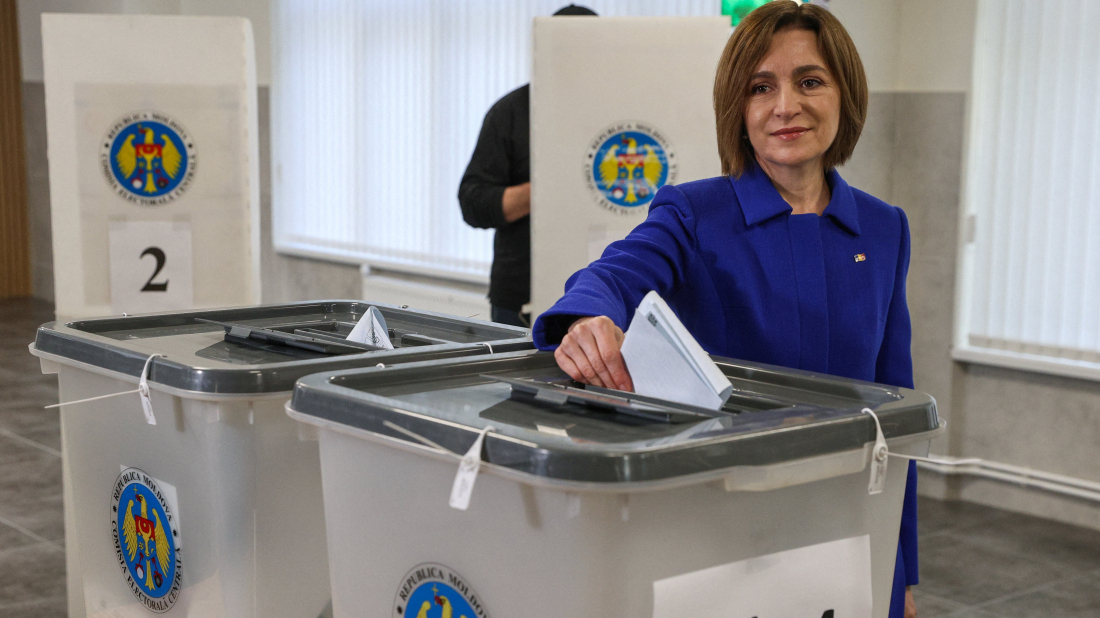live U.S. confirms troop deaths: All the latest news on Middle East conflict
The widening war between Iran, U.S. and Israel is leaving civilians and soldiers caught in its wake. Thousands of people are stranded across the Gu...

Moldova votes in a tight parliamentary contest seen as pivotal for its EU ambitions, with President Maia Sandu warning of Russian interference and polls pointing to a razor-thin race between pro-European and pro-Russian blocs.
Moldovans head to the polls on Sunday in a parliamentary election that could shape the government’s drive to join the European Union, as a popular pro-Russian alliance seeks to pull the country away from closer ties with the bloc.
If no party secures a majority in the 101-seat legislature, coalition bargaining is expected, potentially adding to the instability in one of Europe’s poorest nations, already unsettled by the war in neighbouring Ukraine and alleged Russian interference in politics and religion.
For the pro-EU government, retaining control of parliament is critical to advancing the legislative reforms needed for accession. Yet Moldova, a former Soviet republic, has long swung between pro-European and pro-Russian forces. Roughly a third of the country — the breakaway region of Transdniestria — remains under pro-Russian control and hosts a small Russian military presence.
Sandu warns of Moscow’s influence
President Maia Sandu has framed the election as a decisive test for Moldova’s future, warning that Russian attempts to influence the vote pose a direct threat.
“If Russia gains control over Moldova, the consequences will be immediate and dangerous for our country and for the entire region,” she said in an address last week.
Sandu’s Party of Action and Solidarity (PAS) faces a challenge to its majority, with opposition groups such as the pro-Russian Patriotic Bloc capitalising on voter dissatisfaction over economic hardship and sluggish reforms — grievances compounded, officials say, by widespread disinformation.
Authorities have recently carried out hundreds of raids against allegedly Russia-backed networks accused of funnelling illicit money into parties and stoking unrest. On Friday, the Election Commission barred the Heart of Moldova party, part of the Patriotic Bloc, from the race pending an investigation into illegal financing. Moscow denies meddling, accusing Sandu’s government of stirring anti-Russian sentiment to bolster support.
Divided opinions on EU future
Sandu and PAS argue that EU integration is vital for Moldova to secure its future and reduce Moscow’s grip. But many citizens remain wary, worried about the effect on the country’s largely agricultural economy and already stark regional inequalities.
“We’re a poor country,” said Liudmila Bielova, a 76-year-old poet from Balti. “What will the European Union gain from us?” She said she would probably back the nominally pro-European Alternative bloc.
Others are disillusioned with the political class altogether. “There have been various leaders, and not a single normal, adequate change that would allow me to say, ‘Look, life in the country has become good’,” said Iulian Cazacu, a 26-year-old factory worker, who said he would likely abstain.
Tight race expected
Polling suggests the contest will be close. One survey earlier in September placed the Patriotic Bloc narrowly ahead with 36% support, against PAS’s 34.7% — the first time the ruling party has slipped into second place.
However, Moldova’s sizeable diaspora — absent from opinion polls but generally supportive of pro-European parties — could prove decisive in determining the outcome.
The Kremlin is utilising the recent United States and Israeli military strikes on Iran to validate its ongoing war in Ukraine. Russian officials are pointing to the escalation in the Middle East as evidence that Western nations do not adhere to international rules.
Saudi Arabia’s state oil giant Saudi Aramco closed its Ras Tanura refinery on Monday following an Iranian drone strike, an industry source told Reuters as Tehran retaliated across the Gulf after a U.S.-Israeli attack on Iranian targets over the weekend.
U.S. President Donald Trump said the U.S. military has enough stockpiled weapons to fight wars "forever"; in a social media post late on Monday. The remarks came hours before conflict in Iran and the Middle East entered its fourth day.
China’s Foreign Minister Wang Yi has held talks with his Russian counterpart Sergei Lavrov following recent military strikes carried out by the United States and Israel on targets in Iran, as tensions in the Middle East continue to rise.
U.S. first lady, Melania Trump chaired a UN Security Council meeting on children and education in conflict on Monday (2 March), a move criticised by Iran as hypocritical following U.S. and Israeli strikes that triggered a UN warning about risks to children.
Start your day informed with AnewZ Morning Brief. Here are the top news stories for the 4th of February, covering the latest developments you need to know.
Strikes across the Middle East are intensifying, fuelling travel disruption, driving up global energy prices and forcing diplomatic missions to shut their doors.
U.S. President Donald Trump has said the United States has a “virtually unlimited supply” of munitions and is capable of sustaining military action indefinitely, as the conflict with Iran entered its fourth day.
The United Nations has called for an investigation into a deadly attack on a girls’ primary school in Iran, which Iranian officials say has killed more than 100 children. The U.S. has said its forces “would not” deliberately target a school.
U.S. first lady, Melania Trump chaired a UN Security Council meeting on children and education in conflict on Monday (2 March), a move criticised by Iran as hypocritical following U.S. and Israeli strikes that triggered a UN warning about risks to children.
You can download the AnewZ application from Play Store and the App Store.

What is your opinion on this topic?
Leave the first comment